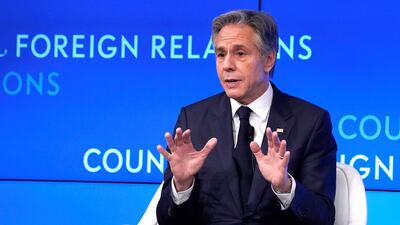Israeli settlement expansions and the escalating violence in the West Bank will make it “a lot tougher” for Israel to normalise relations with Saudi Arabia, US Secretary of State Antony Blinken said on Wednesday.
Mr Blinken told the Council on Foreign Relations in New York that expanding the Abraham Accords, under which Israel normalised ties with the UAE, Bahrain and other Muslim countries, is a becoming an increasingly tough sell.
“We’ve told our friends and allies in Israel that if there's a fire burning in their back yard, it's going to be a lot tougher, if not impossible, to actually both deepen the existing agreements, as well as to expand them to include potentially Saudi Arabia,” he said.
From Washington's perspective, Mr Blinken said it was not in Israel's interest to see the Accords stall.
Riyadh has said it will not normalise ties with Israel until a Palestinian state is established.
Mr Blinken, who travelled to Saudi Arabia this month, said the prospect of normalisation “is incredibly challenging and hard".
He said that while it was not something that could happen overnight, “it's also a real prospect".
Mr Blinken reaffirmed the Biden administration’s commitment to normalisation between Israel and Saudi Arabia, and said there was now potential for a new kind of collaboration, with the kingdom focused on regional integration.
He was also asked about the possibility of a new nuclear agreement with Iran. Several recent reports said an informal deal was in the works but the State Department has denied this.
There is “no agreement in the offing, even as we continue to be willing to explore diplomatic paths”, Mr Blinken said, urging Iran to choose action that does not exacerbate tensions.
The 2015 nuclear agreement limited Iran's uranium enrichment to 3.67 per cent. But in 2018, then-president Donald Trump abandoned the deal and reinstated sanctions to restrict Iran's oil exports.
Iran has since accumulated a significant quantity of uranium enriched to 60 per cent, and the UN's IAEA nuclear watchdog detected traces of uranium enriched to 83.7 per cent, approaching the threshold of 90 per cent which is considered weapons-grade.


